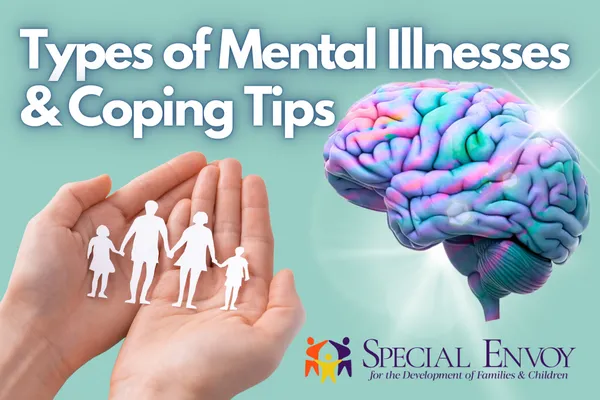Welcome to Our Blogs
INCREASE YOUR AWARENESS
Follow along as we share valuable knowledge and content to enrich and empower your everyday life.

Types of Mental Illnesses & Coping Tips
A mental disorder [illness] is characterized by a clinically significant disturbance in an individual’s cognition, emotional regulation, or behaviour. It is usually associated with distress or impairment in important areas of functioning. There are many different types of mental disorders. Mental disorders may also be referred to as mental health conditions.

Anxiety disorders are characterised by excessive fear and worry and related behavioural disturbances. Having occasional feelings of anxiety is a normal part of life, but people with anxiety disorders experience frequent and excessive anxiety, fear, terror and panic in everyday situations. These feelings are unhealthy if they affect your quality of life and prevent you from functioning normally.
Coping Tips:
Keep Physically Active: Exercise is a powerful stress reducer. It can improve your mood and help you stay healthy. Start out slowly, and gradually increase the amount and intensity of your activities.
Use Stress management & relaxation techniques: Visualization techniques, meditation, and yoga are examples of relaxation techniques that can ease anxiety.

Depressive disorder (also known as depression) is a common mental disorder. It involves a depressed mood or loss of pleasure or interest in activities for long periods of time. Depression is different from regular mood changes and feelings about everyday life. It can affect all aspects of life, including relationships with family, friends, and community. It can result from or lead to problems at school and at work. Depression can happen to anyone. People who have lived through abuse, severe losses or other stressful events are more likely to develop depression. Women are more likely to have depression than men.
Coping Tips:
Stay connected to friends & family: Make it a habit to stay connected to friends and family who support you and you feel safe to be around.
Seek health from a healthcare provider: If coping mechanisms don’t help to alleviate your depression, seek help from a medical professional or a healthcare provider like a therapist for personalized coping mechanism.

Post-Traumatic Stress Disorder (PTSD) is a disorder that develops in some people who have experienced a shocking, scary, or dangerous event. It is natural to feel afraid during and after a traumatic situation. Fear is a part of the body’s “fight-or-flight” response, which helps us avoid or respond to potential danger. It is [characterized] by all the following:
1) re-experiencing the traumatic event or events in the present (intrusive memories, flashbacks, or nightmares);
2) avoidance of thoughts and memories of the event(s), or avoidance of activities, situations, or people reminiscent of the event(s); and
3) persistent perceptions of heightened current threats.
These symptoms persist for at least several weeks and cause significant impairment in functioning. Effective psychological treatment exists.
Coping Tips:
Lean on your loved ones: Identify friends or family members for support. If you feel ready to discuss the traumatic event, you might talk to them about your experience and your feelings. You can also ask loved ones to help you with household tasks or other obligations to relieve some of your daily stress.
Face your feelings: It’s normal to want to avoid thinking about a traumatic event. But not leaving the house, sleeping excessively, isolating yourself from loved ones, and using substances to escape reminders are not healthy ways to cope over time. Though avoidance is normal, too much of it can prolong your stress and keep you from healing. Gradually, try to ease back into a normal routine. Support from loved ones or a mental health professional can help.

Eating disorders, such as anorexia nervosa and bulimia nervosa, involve abnormal eating and preoccupation with food as well as prominent body weight and shape concerns. The symptoms or behaviors result in significant risk or damage to health, significant distress, or significant impairment of functioning. Anorexia nervosa often has its onset during adolescence or early adulthood and is associated with premature death due to medical complications or suicide. Individuals with bulimia nervosa are at a significantly increased risk for substance use, suicidality, and health complications.
Coping Tips:
Avoid diet culture conversations: Steer away from conversations that talk negatively about body image or dieting for a negative outcome.
Healthy eating habits & routines: Create a healthy eating list or seek the assistance of a nutritionist. Develop healthy habits and routines like staying away from too much social media, excessive drinking/smoking, and other harmful activities.
Sources:
American Psychological Association. (2023, January 6). How to cope with traumatic stress. American Psychological Association. https://www.apa.org/topics/trauma/stress
Mayo Clinic Health System. (2021, July). Mental Health Illnesses. https://www.mayoclinichealthsystem.org/search-results?term=PTSD
U.S. Department of Health and Human Services. (n.d.). NIMH . National Institute of Mental Health. https://www.nimh.nih.gov/
World Health Organization. (n.d.). Mental disorders. World Health Organization. https://www.who.int/news-room/fact-sheets/detail/mental-disorders
@ Copyright 2025 - Special Envoy for the Development of Families & Children| All rights reserved

